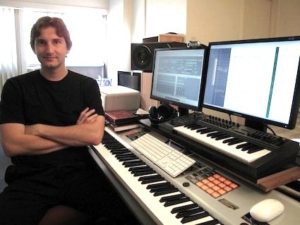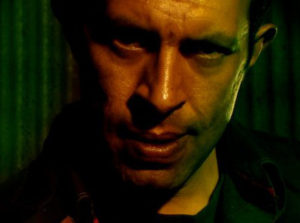
The world-premier of ‘The Day Hollywood Died’ was launched to a sell-out crowd in Hoyts Cinema at Fox Studio’s Entertainment Quarter in Sydney. What I attended was more than the launch of a film; I was privileged to witness to the launch of new careers. It was the day that first-time film-makers shattered every barrier (and indeed there were obstacles galore) to showcase talent plus drive plus determination plus passion, mixed with vision, perseverance, love, stubbornness, and professionalism by the bucket-load.

It’s a wonder the writer, director, and producers were not making their speeches via satellite from the local hospital, saying something like, ‘Sorry folks, we can’t join you because we are on a drip. Doctor’s orders. This film nearly killed us.’
When we critics speak of artists who are driven by energy and passion, we do not mean to portray a fluffy notion of fun-loving youngsters prancing around pumping high-fives into the air. Energy and passion (the type on which Director Ronnie S Riskalla, Producer Sam Kanj, and writer KG Donovan were surviving) would be prohibited substances if they could be bottled. The energy and passion that were required, and that were expended on ‘The Day Hollywood Died’ were of a potentially lethal dose that the FDA and the TGA would otherwise have regulated, due to the sheer dangers of the powerful active ingredients. Five years of hard labour. Five years of stressful days and depleting nights. Everything went wrong. They had to learn fast. They fathomed the toughest lesson of all — ideas in one’s head, are not easily squeezed out into a world that does not understand brain-speak. Creativity comes from the brain. Humans do not speak ‘brain’. They think in brain-speak, but do not communicate in ‘brain-speak’. In fact, humans speak nothing at all. We are born without a language. We must learn a language. Creators have to take an idea and give it birth thorough language, colour, imagery, stunts, action, dialogue, make-up, special effects, music, and a plot — while an audience sucks these stimuli through eyes and ears, in the hope that they can re-assemble these artificial media in their own head, in such a way as to see and perceive and comprehend what the creators meant to express in the first place. That’s one mighty task.
In this day and age, anyone can make a film. Anyone can write a book. Anyone can sing. Click, copy, paste, repeat, randomise, synthesise, upload, and distribute. However, how many people can do what Donovan, Riskalla, and Kanj have done? Very few. And fewer than that! Through ‘The Day Hollywood Died’, these creative geniuses were running a marathon — through sludge and mud. They had to battle deadlines, budgets, charlatans, time-wasters, frustrations, administration, and non-belivers in a cut-throat industry that harbours three kinds of people (I’ll leave you to work out the categories). They did it alone, by the grace of God, and with the help of dozens of angels who enlisted not as mere actors, editors, cast, and crew, but as supporters rushing to applaud, to up-lift, to sustain, to cheer, and to roll-up their sleeves and jump in the deep end, as their way of saying, ‘We believe in your talent; we see your vision; we delight in your mission — count us in!’ And so the team-effort was born. Cast and crew, hand in hand, to the end. Doing whatever it takes — all from the heart.
 Together, the cast and crew churned a cyclone that hit the big screen on Friday 4 May 2012 to an eclectic crowd that watched a film so shocking and so captivating and so engrossing that at the end, there were more salutes than applause as people felt violated by a film that can hypnotise them, control their mind, focus their thinking, drive them batty with curiosity, and take them to a great height for 89 minutes until the final 60 seconds when the tightly-wound spring is flicked and whoosh, down we all plummeted in free-fall; heading to Earth with neither a parachute nor a safety net. Wham, bang, splash… we crashed after the final twist was revealed just one minute from the end. Breathless. Stunning. Clever. Dangerous. The audience was laughing in anxiety. They (and I) were relieved to understand what the mind-bender was all about. What a great relief to finally understand what the movie was all about. In fact, Rising Pictures might well find itself needing government clearance for its future productions, if it’s going to dabble in such mind-bending thrillers. Either that, or have oxygen bottles on standby.
Together, the cast and crew churned a cyclone that hit the big screen on Friday 4 May 2012 to an eclectic crowd that watched a film so shocking and so captivating and so engrossing that at the end, there were more salutes than applause as people felt violated by a film that can hypnotise them, control their mind, focus their thinking, drive them batty with curiosity, and take them to a great height for 89 minutes until the final 60 seconds when the tightly-wound spring is flicked and whoosh, down we all plummeted in free-fall; heading to Earth with neither a parachute nor a safety net. Wham, bang, splash… we crashed after the final twist was revealed just one minute from the end. Breathless. Stunning. Clever. Dangerous. The audience was laughing in anxiety. They (and I) were relieved to understand what the mind-bender was all about. What a great relief to finally understand what the movie was all about. In fact, Rising Pictures might well find itself needing government clearance for its future productions, if it’s going to dabble in such mind-bending thrillers. Either that, or have oxygen bottles on standby.
 If that’s not manipulative enough, what about the magnetic music from Henrique Dib? This maestro turbo-charged every scene via a haunting heart-thumping orchestral whirlwind that extenuated eerie drama, perplexing action, and, at times, stomach-wrenching conflict that were made more disturbing though ‘suggestion’ than through ‘deed’. We did not have to ‘see’ the ghastly deeds to feel their effect. The dialogue was so believable that we entered the chamber and became more than spectators — we became witnesses who winched and squirmed more at what ‘might have happened’ and at what ‘could have happened’, than by what ‘did happen’. How was that possible? It was all due to the skilful actors. They grabbed us by the collar and dragged us out of our plush velvet chairs, into their ghastly world. We became reluctant accomplices, watching the dilemma, wondering what we might do and how we might escape. The characters were crazy, and believably so. Well, I must admit that I was sucked into the whole story so much, that I pondered whether or not it would be safe afterwards to meet the actors on the red carpet. Would I want to befriend such demented people? Ah, and there is the magic in the talent — actors who play their part so convincingly well, that we find it impossible to believe that they were acting. They must be real loonies, hired to do what they do best… scare people by quixotic antics and through irritating, illogical, irrational, unpredictable rants; made worse by weapons, knives, pistols, and machine guns. Dear oh dear. There was a scene where three people were shouting each other down, each pointing a weapon at the other. Talk about flash-points!
If that’s not manipulative enough, what about the magnetic music from Henrique Dib? This maestro turbo-charged every scene via a haunting heart-thumping orchestral whirlwind that extenuated eerie drama, perplexing action, and, at times, stomach-wrenching conflict that were made more disturbing though ‘suggestion’ than through ‘deed’. We did not have to ‘see’ the ghastly deeds to feel their effect. The dialogue was so believable that we entered the chamber and became more than spectators — we became witnesses who winched and squirmed more at what ‘might have happened’ and at what ‘could have happened’, than by what ‘did happen’. How was that possible? It was all due to the skilful actors. They grabbed us by the collar and dragged us out of our plush velvet chairs, into their ghastly world. We became reluctant accomplices, watching the dilemma, wondering what we might do and how we might escape. The characters were crazy, and believably so. Well, I must admit that I was sucked into the whole story so much, that I pondered whether or not it would be safe afterwards to meet the actors on the red carpet. Would I want to befriend such demented people? Ah, and there is the magic in the talent — actors who play their part so convincingly well, that we find it impossible to believe that they were acting. They must be real loonies, hired to do what they do best… scare people by quixotic antics and through irritating, illogical, irrational, unpredictable rants; made worse by weapons, knives, pistols, and machine guns. Dear oh dear. There was a scene where three people were shouting each other down, each pointing a weapon at the other. Talk about flash-points!
 We had actor Drew Pearson playing the part of a man who, seconds after entering the danger zone, ends up on the floor. And every time we saw him, he was beaten-up some more. Bashed, kicked, punched, shot, and bitten (as in having his finger bitten off). Pearson played the part so well, that we felt his pain. Constant, consistent, incessant pain. Ouch. I am not sure how Pearson would explain this in his resume. What would he say? ‘I played my part beautifully. I was on the floor, in agony, the whole time.’ Strange role. Perfectly executed. Painfully portrayed! I winched every time I saw him. His character never relented. Pearson was the face of pain and suffering, and it was mesmerising and morbid.
We had actor Drew Pearson playing the part of a man who, seconds after entering the danger zone, ends up on the floor. And every time we saw him, he was beaten-up some more. Bashed, kicked, punched, shot, and bitten (as in having his finger bitten off). Pearson played the part so well, that we felt his pain. Constant, consistent, incessant pain. Ouch. I am not sure how Pearson would explain this in his resume. What would he say? ‘I played my part beautifully. I was on the floor, in agony, the whole time.’ Strange role. Perfectly executed. Painfully portrayed! I winched every time I saw him. His character never relented. Pearson was the face of pain and suffering, and it was mesmerising and morbid.
 Tommy Brandson had better stay out of legal trouble. If he ends up in court for any reason, I can imagine the prosecutors showing this film to a jury saying, ‘Look at what this man is capable of. How can this man be innocent when, in this film, we see his true colours — a complete nut-case.’ Brandson played the part of a man so erratic, that it would seem plausible for real gangsters to make him an offer. I can just hear the husky voice on the phone saying, ‘Mr Brandson, we need you to join our family. You’ll head-up the collections division.’ It was a spell-binding performance from a young actor who gave birth to a character that deserves to be franchised and syndicated. Maybe he can start his own TV series. Maybe he can play the part of a cop. He can be the good cop and the bad cop, rolled into one. Work that out!
Tommy Brandson had better stay out of legal trouble. If he ends up in court for any reason, I can imagine the prosecutors showing this film to a jury saying, ‘Look at what this man is capable of. How can this man be innocent when, in this film, we see his true colours — a complete nut-case.’ Brandson played the part of a man so erratic, that it would seem plausible for real gangsters to make him an offer. I can just hear the husky voice on the phone saying, ‘Mr Brandson, we need you to join our family. You’ll head-up the collections division.’ It was a spell-binding performance from a young actor who gave birth to a character that deserves to be franchised and syndicated. Maybe he can start his own TV series. Maybe he can play the part of a cop. He can be the good cop and the bad cop, rolled into one. Work that out!
 Such intensity requires some relief, just to remind people to breathe. This is where Nenif David comes in. He portrays a fast-talking flip who strings lovely words together, at high speed, yet almost nothing makes sense. We just work it out after he finishes speaking. What did he say? Oh, I think I know what he meant. David’s character was comical, but not in the humorous sense. The character was down-and-out a stupid man in disguise. Weird, that! Every time he opened his mouth, the audience laughed, giggled, and chuckled, partly because he reminded them of a stupid person they know; and partly because he was endearing himself to them; and partly because everyone was so wound-up that they needed any excuse to vent (as in, release pressure through an air vent) to avoid a build-up of blood-pressure caused by the suspense and drama that was unfolding at such a fast pace that it was painful — physically and mentally (because all the while, we stood there, shoulder to shoulder with these basket-cases simply because we needed to know, we wanted to know, we had to know, what they were doing, why they were in that mess, and why they were in such dire straits. What led to the debacle? Who arranged this almightily right-royal cock-up? What was the missing link? We had to know. So we hung around, fixated on a plot so sinister and so peculiar, that we wondered if a solution were possible. Maybe not all problems can be solved. Maybe ‘The Day Hollywood Died’ was simply a story of a balls-up. A diabolical series of events that just happened, for no rhyme or reason. But then again, what if there was method to the madness? So we signed-up. We were captivated and glued to the story, the plot, and the drama. In truth, we were snared. Caught-up in a spring that wound and wound. Something was going to give way, and whatever it was, it was going to be catastrophic.
Such intensity requires some relief, just to remind people to breathe. This is where Nenif David comes in. He portrays a fast-talking flip who strings lovely words together, at high speed, yet almost nothing makes sense. We just work it out after he finishes speaking. What did he say? Oh, I think I know what he meant. David’s character was comical, but not in the humorous sense. The character was down-and-out a stupid man in disguise. Weird, that! Every time he opened his mouth, the audience laughed, giggled, and chuckled, partly because he reminded them of a stupid person they know; and partly because he was endearing himself to them; and partly because everyone was so wound-up that they needed any excuse to vent (as in, release pressure through an air vent) to avoid a build-up of blood-pressure caused by the suspense and drama that was unfolding at such a fast pace that it was painful — physically and mentally (because all the while, we stood there, shoulder to shoulder with these basket-cases simply because we needed to know, we wanted to know, we had to know, what they were doing, why they were in that mess, and why they were in such dire straits. What led to the debacle? Who arranged this almightily right-royal cock-up? What was the missing link? We had to know. So we hung around, fixated on a plot so sinister and so peculiar, that we wondered if a solution were possible. Maybe not all problems can be solved. Maybe ‘The Day Hollywood Died’ was simply a story of a balls-up. A diabolical series of events that just happened, for no rhyme or reason. But then again, what if there was method to the madness? So we signed-up. We were captivated and glued to the story, the plot, and the drama. In truth, we were snared. Caught-up in a spring that wound and wound. Something was going to give way, and whatever it was, it was going to be catastrophic.
 The main female character was brought to life by Amy McWatters. The woman she played was someone you’d warm to, want to befriend, and then soon realise that you had made a terrible mistake. How would you back-out of a relationship with an amoral woman who was tough, ruthless, yet sexy and almost girlish. When the audience was perving on violence of the unspeakable variety, there was this character smiling, smirking, delighting, while showing us that she was curious about what might happen, and how it might hurt. Alarm bells were ringing in my head. Women like that worry me. McWatters developed a character so strange and so real, that it was the audience who could be accused of being schizophrenic — loving her for half a second, and wanting to slap her soon after.
The main female character was brought to life by Amy McWatters. The woman she played was someone you’d warm to, want to befriend, and then soon realise that you had made a terrible mistake. How would you back-out of a relationship with an amoral woman who was tough, ruthless, yet sexy and almost girlish. When the audience was perving on violence of the unspeakable variety, there was this character smiling, smirking, delighting, while showing us that she was curious about what might happen, and how it might hurt. Alarm bells were ringing in my head. Women like that worry me. McWatters developed a character so strange and so real, that it was the audience who could be accused of being schizophrenic — loving her for half a second, and wanting to slap her soon after.
 The first on the scene was the towering Eric Rizk whose character jumped out from the big screen to make it clear to all concerned that he was the boss. When he asked questions, he demanded answers. If there were no answers, someone was going to get hurt. Think of some answers quick-smart, for heaven’s sake, and be quick about it. His character reminded me why the world is in such a mess. It’s thanks to the unreasonable people who just do not care about anyone else. Do it my way, and get out of my way. What a creed. Rizk set the tone for the film. It was going to be a no-nonsense rough ride that was devoid of small-talk. Ah, that’s something I’ve been meaning to tell you: ‘The Day Hollywood Died’ was a captivating thriller that dished no small-talk, no chit-chat, no diversions, no distractions. That was the secret to the loading of the spring. Tighter and tighter, stronger and stronger. No time to waste. Don’t dare look elsewhere. A loaded spring eventually has only one direction in which to go, begging and threatening to be released. And the wham-bam was all in the mind. The hard action, the explosions, the helicopter drop, the car chase… all loaded a spring whose release was a cerebral one. Mental agony.
The first on the scene was the towering Eric Rizk whose character jumped out from the big screen to make it clear to all concerned that he was the boss. When he asked questions, he demanded answers. If there were no answers, someone was going to get hurt. Think of some answers quick-smart, for heaven’s sake, and be quick about it. His character reminded me why the world is in such a mess. It’s thanks to the unreasonable people who just do not care about anyone else. Do it my way, and get out of my way. What a creed. Rizk set the tone for the film. It was going to be a no-nonsense rough ride that was devoid of small-talk. Ah, that’s something I’ve been meaning to tell you: ‘The Day Hollywood Died’ was a captivating thriller that dished no small-talk, no chit-chat, no diversions, no distractions. That was the secret to the loading of the spring. Tighter and tighter, stronger and stronger. No time to waste. Don’t dare look elsewhere. A loaded spring eventually has only one direction in which to go, begging and threatening to be released. And the wham-bam was all in the mind. The hard action, the explosions, the helicopter drop, the car chase… all loaded a spring whose release was a cerebral one. Mental agony.
The ah-ha moment was personal: almost a foreboding, a warning to the viewer that life is fragile and problematic when we dare to abuse others. The film had a message. A warning relating to something of which each of us is capable (and perhaps guilty). Oh dear, the final sixty seconds of the film were terribly disturbing, simply because Donovan, Riskalla, and Kanj turned the screen into a mirror-of-sorts. It was an embarrassing heart-searching moment. Could this happen to me? It sure can! Now that’s haunting and menacing.
Who would have thought that ‘The Day Hollywood Died’ could be a thought-provoking film that pointed the finger at the viewer and wagged that digit, saying, ‘Is there anything to which you ought to own up?’
CONNECTIONS
You can learn more about Rising Pictures and ‘The Day Hollywood Died’ through their FaceBook page if you click here.
To read a review I posted on the Internet Movie Database (IMDB), please click here.
Music Composer Henrique Dib’s FaceBook page is here. The fabulous album is available on iTunes.



Comments are closed.